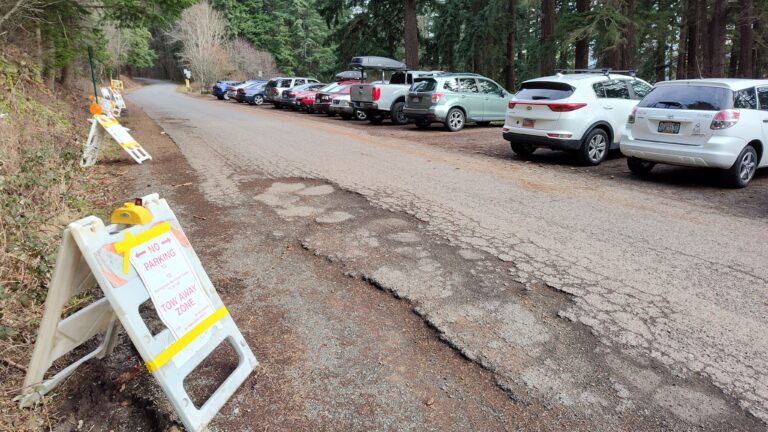Editor,
On the way to Sehome Village today, I noted the Oregon Trail wagon wheel ruts just past the Samish Way Interstate 5 overpass, as mentioned from time to time by editor Ron Judd. Being an enthusiast of transportation history, may I suggest they be preserved as historical artifacts and not summarily paved over? How else will we ever know that the Oregon Trail once reached Whatcom County — a fact that’s been erased from the history books.
That said, may I suggest for preservation two other pieces of roadway history? One being the streetcar tracks still glistening in the thoroughfares of Fairhaven. Let them remain forever! As a monument to a form of effective urban transportation long since sacrificed to the god of Unquestioned Modernity.
The less-worthy relic, still deserving of preservation, is the original Depression-era concrete roadway of old Highway 99, the downhill portion of Samish Way as it courses from Lake Padden toward Sehome. The surface of which, besides being rich in historicity, serves as a speed bump for the plethora of traffic routinely exceeding the posted speed limit by a factor of 10 to 20 miles per hour. Though it must be admitted that, as a traffic control aid, the surface bumps and their makeshift asphalt patches appear to be limited in their effectiveness.
Paul Kenna
Bellingham
Editor,
Thank you for pointing out the impacts of single-use plastic in the sports world (CDN, May 4, 2023) and some efforts to limit their use. Unfortunately, the optimism in the article is that eventually, we can recycle everything when that is just not true. If burned, the methane from the plastic pollutes our air with the second biggest greenhouse gas; if dumped, plastic also pollutes while it slowly disintegrates into microplastics, enters the food chain and causes myriad health issues.
Your article stated: “It is not clear how much the consumption of microplastics is impacting plant, animal and human life.”
That is not true. Recent studies by the Minderoo Foundation, a prestigious scientific organization that studied the impacts on human health of plastic came to these conclusions:
• Plastic chemicals harm human health.
• Everyday exposure to plastic chemicals is linked to health effects including: reproductive health issues; children’s brain health issues; and chronic diseases such as obesity, diabetes and cancer.
• We are exposed at all stages of life from pre-conception onwards.
• Health effects are seen at birth, and in babies, children and adults.
• Three of the leading causes of death — obesity, high blood sugar and high blood pressure — are associated with plastic exposure.
Recycling is not the answer — we would be recycling the poison emitted by the chemicals in the plastic. The only way to stop plastic pollution is to stop making plastic. As convenient as plastic products are, especially single-use, we must get off this bandwagon and move toward sustainable materials if we want to make our climate goals.
For more information, visit the website of the League of Women Voters: lwvbellinghamwhatcom.org.
Jayne Freudenberger
Co-chair Climate Issues Committee
League of Women Voters Bellingham/Whatcom
Editor,
It has recently come to the attention of us water protectors that there are locals firing golf balls into the bay.
We want to ask for your help in protecting the beautiful waters of Puget Sound and spreading awareness of how to keep pollutants at bay. We have noticed a substantial increase in washed-up trash along the coast of Washington, including the shores of Bellingham Bay. This means that in the waters of the Salish Sea, there is a much larger amount of plastic and other pollutants because only a fraction of ocean waste washes up on shore. A large percentage of this waste is golf balls.
Golf balls are among some of the most harmful waste that ends up in Puget Sound because they leak toxic chemicals such as zinc oxide and zinc acrylate, which add to the ball’s flexibility and durability. Over time, these balls also get pounded by the surf and get broken into microplastics, which native animals consume. It clogs their digestion, which then often leads to death. Another harmful pollutant we see too often are bottle caps. They also leak harmful chemicals and end up in the digestive systems of marine wildlife.
Thank you for giving your thoughts to this and for being a protective steward. The Salish Sea thanks you.
Julia Wolgamot
Seventh-grade steward
Bellingham
Editor,
In the May 3 edition of Cascadia Daily News, I found two articles of particular interest and concern. “Bellingham school board moves to reduce programs, staff” and “Mount Baker students explore Bellingham Bay.”
Both of these articles discuss school funding cuts that are taking place in school districts here in Whatcom County, as well as around the state. I find it disappointing that with huge tax surpluses around Washington state that our schools are still finding it hard to fund education. But I also have a hard time wondering why there are so many different school districts doing essentially the same jobs dispersed around both Whatcom County and the state, as well?
Using Whatcom County as an example, why not centralize all of the school districts into one county school board? That would eliminate all the overlapping work that each school board must do in each district. And the money saved by reducing staff and their benefits could be used for its intended purpose: educating students!
Bill Walker
Maple Falls



Commentary response: Nursing-home staffing mandates critical to dignified care